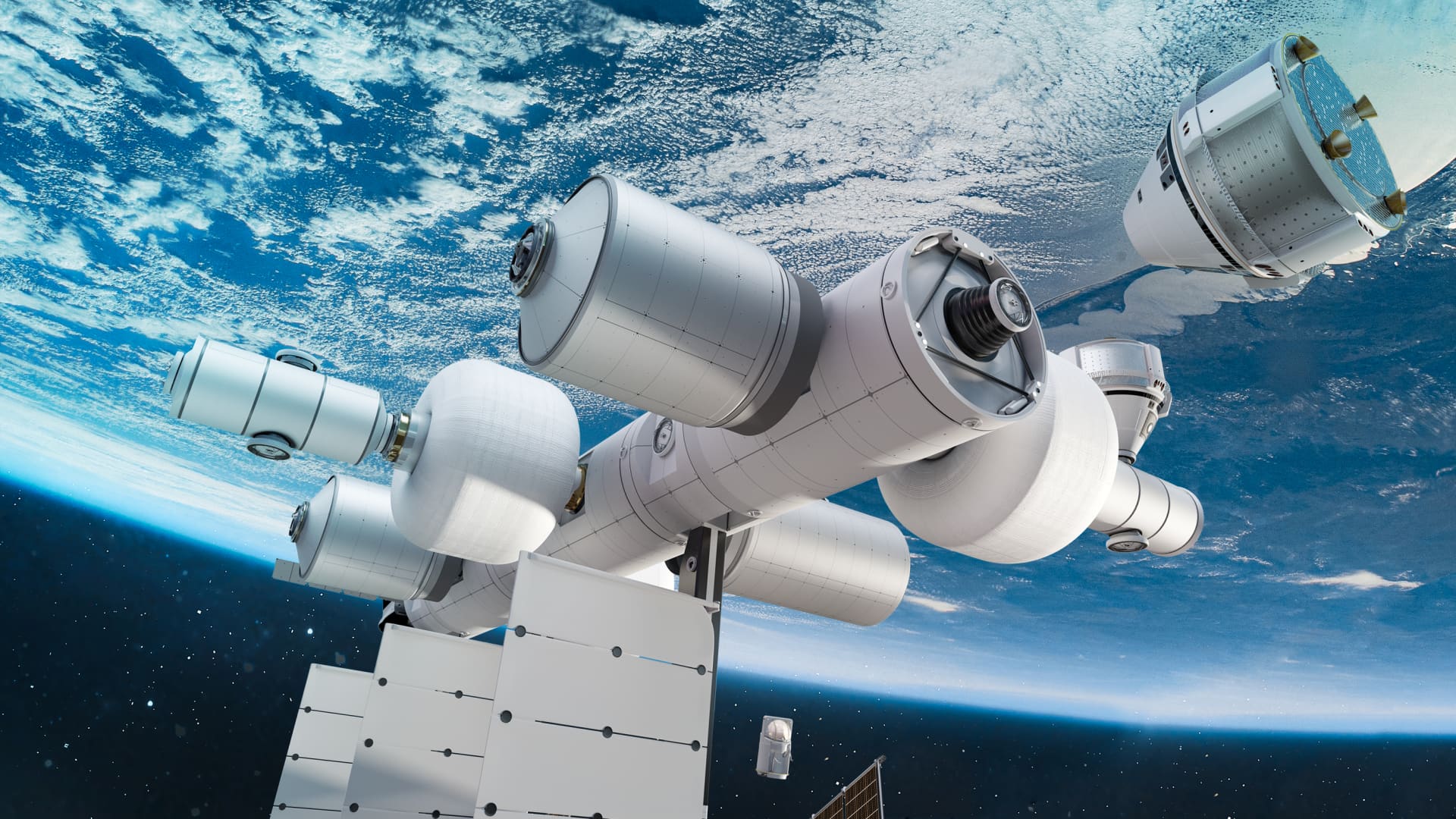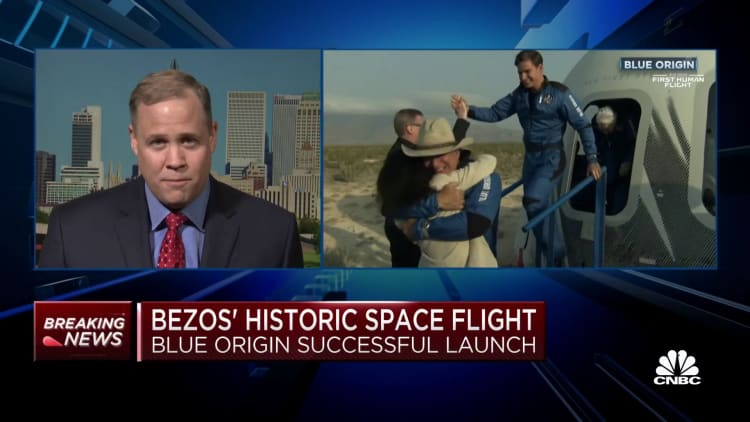
A rendering of the “Orbital Reef” space station in orbit.
Blue Origin
The Orbital Reef space station partnership between Jeff Bezos’ Blue Origin and Sierra Space is on rocky footing, CNBC has learned.
The companies announced Orbital Reef as a co-led project in 2021, but updates about the project dried up in the past year. The pair of private space companies are now navigating a potential end to the Orbital Reef partnership, according to three people who spoke to CNBC about the situation.
Those people, speaking on the condition of anonymity to discuss nonpublic matters, emphasized that discussions are ongoing and described the situation as fluid. But other development projects with more significant current contracts – such as Blue Origin’s Blue Moon lunar lander and Sierra Space’s Dream Chaser spaceplane – have taken higher priority for both companies, those people said.
It’s becoming increasingly likely that Blue Origin and Sierra Space will go their separate ways, leaving behind joint efforts to develop Orbital Reef, according to those sources.
Sign up here to receive weekly editions of CNBC’s Investing in Space newsletter.
Shortly after unveiling the Orbital Reef project, Blue Origin won a $130 million contract from NASA for design work on the private space station. That contract was one of three funded Space Act Agreements (SAA) that NASA issued for the first phase of its Commercial LEO Destinations (CLD) program.
Blue is the prime contractor under that NASA award, with Sierra as a subcontractor.
NASA spokesperson Rebecca Wickes told CNBC in a statement that the agency has so far paid Blue Origin $24 million of the total contract amount for completing specified milestones. As of yet “there are no current plans to transfer the agreement,” Wickes said.
Sierra did not respond to CNBC’s request for comment on Orbital Reef. Neither did Blue Origin, but the company, shortly after being reached by CNBC, posted on social media that it is making “progress on our Commercial Destinations Space Act Agreement with NASA.”
“Our team is currently testing window frames and materials in a relevant space environment,” Blue Origin said, without mentioning Orbital Reef by name.
Orbital Reef erosion
An artist’s rendering of a commercial space station in orbit.
Sierra Space
Blue originally unveiled Orbital Reef alongside Sierra, envisioning a “mixed use business park” in space. The first major pieces of Orbital Reef were scheduled to launch in 2027, with the companies aiming to begin service around the time the International Space Station retires near the end of the decade.
Habitable space stations have long been an interest for Blue Origin, with Bezos’ vision for the company to create a future where “millions of people are living and working in space to benefit Earth.” Similarly, Sierra has been developing an habitat concept for years, known as LIFE (“Large Integrated Flexible Environment”).
Several companies are also working to build private space stations, with competing projects being led by Axiom, Voyager Space, Northrop Grumman and Vast.
The Orbital Reef team also includes Boeing, Redwire, Amazon, Genesis Engineering Solutions, and Arizona State University underneath Blue and Sierra.
Orbital Reef is not seen as a top priority for either company, according to three people familiar with the companies. Two of those sources pointed CNBC to a shift in Blue Origin’s interests after the company won a $3.4 billion NASA contract to build a crew lunar lander – noting its space station and lunar lander programs compete for resources in the same business unit.
Blue Origin CEO Bob Smith is leaving at the end of the year and new leader Dave Limp will need to execute on other major projects – including its New Shepard and New Glenn rockets, as well as its BE-4 engine production.
Similarly, much of Sierra’s resources are devoted to getting the initial cargo variation of its reusable Dream Chaser spaceplane flying. It has been developing Dream Chaser for more than a decade, under contract to fly cargo for NASA to the International Space Station.
The company earlier this week raised $290 million in new funding and hopes to fly Dream Chaser to the ISS for the first time next year.
There have been signs the Orbital Reef project was unraveling: The website for the project, created jointly by Blue and Sierra, hasn’t published an update on the station’s development in more than a year. As of Thursday, neither company’s careers websites have job openings that mention “Orbital Reef,” despite having dozens of listings mention the project in the past. And Sierra Space dropped references to Orbital Reef in its most recent press releases, focusing solely on its own habitat work.
From NASA’s viewpoint, changes to the structure or involvement of different companies in the first phase of a project like this one are not surprising. For example, Northrop Grumman didn’t rejoin Blue Origin’s team when the company bid a second time for a crew lunar lander. And, more relevant to the CLD program, another space station project called Starlab saw Airbus take the place of Lockheed Martin as the core habitat’s builder.
For its part, Sierra has continued to test and develop LIFE – an inflatable module that made up a major part of the Orbital Reef architecture. Sierra has regularly posted updates about milestones in testing habitats, such as a recent “burst” testing of a sub-scale prototype. Last month, Sierra announced plans to launch a “pathfinder” demonstration mission of its LIFE (Large Integrated Flexible Environment) habitat in 2026.








